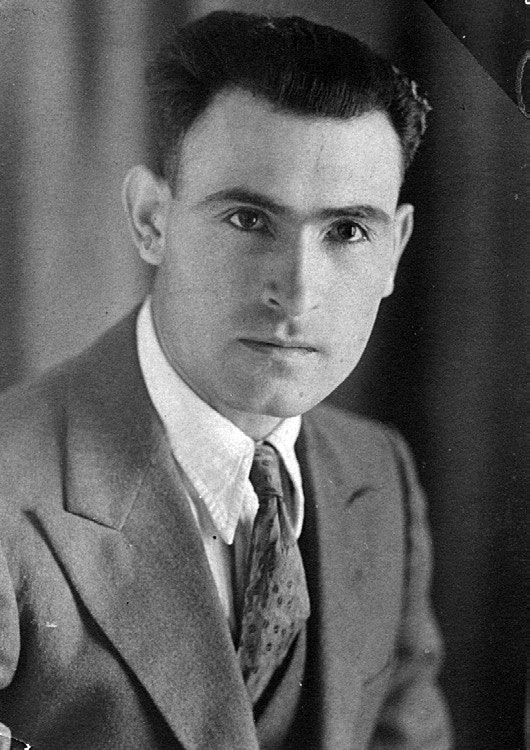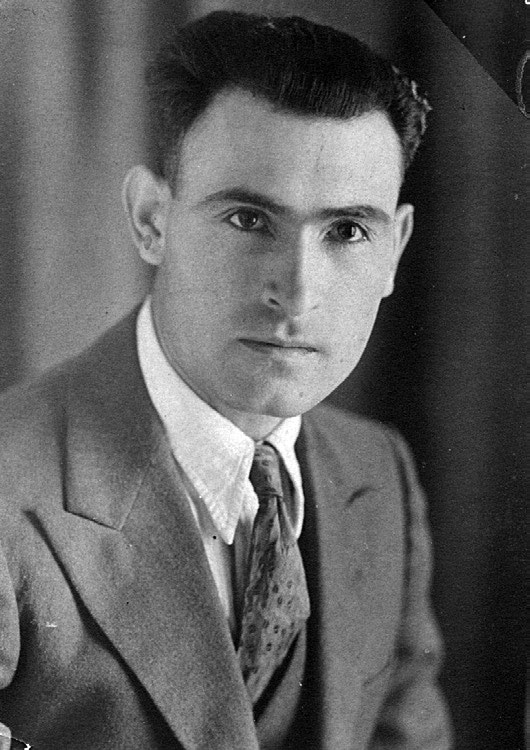Prepared for Questa’s centennial celebration in 1935, it is a direct link to Questa’s past. The historian Father Thomas J. Steele described this work as “…the product of oral tradition of discourse and poetry.”
This poem was published in La Revista de Taos (June 3, 1937, p. 7) and it was also collected by Reyes N. Martínez, for the WPA Writers’ Project (Oct 7, 1937; Gilberto Benito Córdova #396).
Father Steele’s analysis—“Remembered Backward, Repeated Forward: J.P. Rael’s ‘Los Pobladores de Questa’”—of this poem was published in The Journal of the Southwest 40(1):87–105.
English
The Founders of Questa
Perhaps like pilgrims the first settlers
did not come over highways nor in flying carriages.
They set out very humbly with a resolve
to invade these regions and establish a settlement.
Let us imagine we see them
and we see them coming down yonder by the Kiowa Trail—
they come walking afoot.
Their flocks ahead of them and their burros loaded down.
Poor little settlers how weary they walk!
When they came down to the river they drank its precious water,
they pitched camp in a hurry, and they slept in a hut.
Anxious for the dawn, they awakened very early,
and from there they moved to the site where they settled.
They were always a religious people and so they invoked the saints,
and with the Christian faith they founded a settlement here.
They joined in consultation to give the place a name;
San Antonio del Río Colorado they decided it should be called.
Its earlier name
you will know here by this, but for some reason
they changed it to “Questa.”
They started their work with unmatched diligence.
Here some men build stout log cabins, and over there others build a jacal.
Later others arrived
along with all their families and built other houses forming a fortified plaza.
When the Indians found out
that their lands were being invaded, they fought with bow and arrow and threatened our survival.
The settlers fought back and chased the enemy away. They fortified themselves and organized a council.
They placed a sentinel
on the mountain to the east, and if the Indians returned he’d warn the people.
The mountain is very high as you can see from here,
and since then the people called it Sentinel Peak.
The names used in those times were redolent of that era.
The eminence to the southeast is “Flag Mountain.”
The sentinel watching
with the fidelity of a servant/slave according to the signs he gave
the people kept themselves in readiness.
When the crisis had passed and the settlement grew, they cultivated the valley and raised great crops.
The ranges became productive with the increase of livestock,
the granaries were filled to overflowing with the grain stored in them.
The people lived in happiness without any disorders.
They danced, told stories,
and amused themselves with songs.
The era of prosperity
and of happiness was this one. There was no calamity,
only celebrations and festivity.
The wedding feasts
were worthy of mention:
there was not a single neighbor
who did not gather at the great table.
The marshals of the wedding dance with complete authority
named the dancers,
and no others were allowed to dance.
Like gathering for a religious service (or nowadays at the movies)
all the people gathered to hear the story-teller.
The late Marianito
who is still happily remembered was one of the most famous
for telling both fable and fact
At the time of the harvest
the people worked side by side, harvesting their crops
and helping each other like friends.
Everyone without thought of money and armed with a small sickle
cut for his neighbor
the wheat and the corn.
To husk the corn
stored in each courtyard took but a short hour
when all the relatives gathered.
At the time of the threshing
which they did on the the threshing-floor, it was round and round with the mares
or the nanny-goats and ewes;
then with the pitchfork
throwing the wheat up into the wind— so it was the grain was separated without paying any percentage.
In the stone grist-mill
they ground their corn and wheat, then used a strainer
to separate the fine flour [from the bran].
Mounted on horseback
with their spears well sharpened, the buffalo-hunters would set out to hunt on the plains.
The hunters would return with meat in superabundance;
they would share with their neighbors and still have enough for themselves.
And also the cañute-players raised the dawn all fired up playing the game of cañute betting corn and wheat.
Their plays, games, get-togethers were other attractions;
“Comanches,” “Pastores,” “Matachines” were great diversions.
On Santa Ana’s feast day as well as on Santiago’s,
they fought for the championship, and they did not fight for money.
They would gather on the plaza, many men on horseback
ready to enter the fray—
they rode forth to “fight rooster.”
One after another they went on very fast horses,
swinging down from their saddles, trying to pull the rooster.
and when someone pulled it up the rest would pursue him,
and when they have caught up with him, then the war would begin,
striking one another with the rooster’s beak worse than in a prizefight,
beating each other to pieces—
thus they crowned their champions.
Afterwards they turned to dancing to the music of a violin,
dancing ancient dances;
their enjoyment had no limit.
They lighted their dance halls with candles they had made; they trod their floors
which they laid of mud.
It was not strange to see moccasins or trousers or deerskin;
the clothes they wore then were a style not used today.
Also on Christmas Eve
they did what today we do not see— the Aguelos would come around
and [boys] would come begging “Oremos.”
And they would light up the village with ricks of pitchpine,
and they held processions led by the priest.
They had few schools,
their teachers were uneducated, but their discipline was very strict; their books were few in number.
Their styles were simple, their behavior controlled, obedience without equal and fidelity to their word.
And when they held a vigil,
At the time of the harvest
the people worked side by side, harvesting their crops
and helping each other like friends.
Everyone without thought of money and armed with a small sickle
cut for his neighbor
the wheat and the corn.
To husk the corn
stored in each courtyard took but a short hour
when all the relatives gathered.
At the time of the threshing
which they did on the the threshing-floor, it was round and round with the mares
or the nanny-goats and ewes;
then with the pitchfork
throwing the wheat up into the wind— so it was the grain was separated without paying any percentage.
In the stone grist-mill
they ground their corn and wheat, then used a strainer
to separate the fine flour [from the bran].
Mounted on horseback
with their spears well sharpened, the buffalo-hunters would set out to hunt on the plains.
The hunters would return with meat in superabundance;
they would share with their neighbors and still have enough for themselves.
And also the cañute-players raised the dawn all fired up playing the game of cañute betting corn and wheat.
Their plays, games, get-togethers were other attractions;
“Comanches,” “Pastores,” “Matachines” were great diversions.
On Santa Ana’s feast day as well as on Santiago’s,
they fought for the championship, and they did not fight for money.
They would gather on the plaza, many men on horseback
ready to enter the fray—
they rode forth to “fight rooster.”
One after another they went on very fast horses,
swinging down from their saddles, trying to pull the rooster.
and when someone pulled it up the rest would pursue him,
and when they have caught up with him, then the war would begin,
striking one another with the rooster’s beak worse than in a prizefight,
beating each other to pieces—
thus they crowned their champions.
Afterwards they turned to dancing to the music of a violin,
dancing ancient dances;
their enjoyment had no limit.
They lighted their dance halls with candles they had made; they trod their floors
which they laid of mud.
It was not strange to see moccasins or trousers or deerskin;
the clothes they wore then were a style not used today.
Also on Christmas Eve
they did what today we do not see— the Aguelos would come around
and [boys] would come begging “Oremos.”
And they would light up the village with ricks of pitchpine,
and they held processions led by the priest.
They had few schools,
their teachers were uneducated, but their discipline was very strict; their books were few in number.
Their styles were simple, their behavior controlled, obedience without equal and fidelity to their word.
And when they held a vigil,
with complete respect and fervor
they all prayed the rosary,
and then came to supper.
Good conduct during the wake they observed out of reverence, meeting moral standards
a symbol of decency.
There were song-leaders then who sang the alabados,
none better than today though graduates in music.
Afterwards an enemy came and took up residence here who was said to be stamped and imported from the east.
This imported enemy and the wine la raza made have caused great damage
and have ruined this town.
Later the moonshiner came— white lightning in abundance— making lots of money
and drinking up the profits.
In earlier times good morals prevailed in every action, and violating another’s rights was an act of cowardice.
but times have changed
and have changed with a bang.
Self-respect has been lost and prudence faded away.
Today they travel swiftly and speak very harshly.
Everybody has a good automobile and drinks the best liquor:
moonshine is behind us,
and so is our good self-respect, but “Paul Jones” or “Mr. Boston” will bring the same effect.
Few are those who work diligently and with care.
“And from hunger no one need die,” and surely bread will not be lacking.
We will now await the change that is destined to come— another era will come
and with it another way of life.
Thus a hundred years have passed like the passing of a sigh.
The founders are gone,
and only their descendants remain.
They left us monuments which we will never forget. They built us a church—
how deeply we are indebted to them!
People fall short today
of being the equals of the founders. Whatever we say we amount to,
it is nothing but fantasy.
Español
Los Pobladores de Questa
Tal vez como peregrinos, Los primeros pobladores No vinieron por caminos Ni en carruajes voladores.
Se marcharon muy humildes Con una resolución
De invadir estas regiones Y hacer una población.
Imaginemos mirar
Y de allí verlos bajando Por la vereda de los Kaiwas A pie vienen caminando
Sus partidas por delante
Y sus haznos bien cargados Pobrecitos pobladores Como vienen fatigados.
Cuado bajaron al río Bebieron su agua preciosa Hicieron campo de prisa Durmieron en una chosa.
Ansiosos de que aclarara Muy al alba recordaron, Y de allí se trasladaron
Al sitio que ellos poblaron.
Ellos eron religiosos
Y a los Santos imploraron; Con la fe del cristianismo Aquí un poblacíon fundaron.
Se juntaron en consulta Para dar nombre al lugar;
San Antonio del Río Colorado Se le tuvo que llamar.
Su nombre más anterior Lo sabran aquí por esta Que por alguna razón
Se los cambiaron a Questa.
A trabajar comenzaron Con esmero sin igual
Por aquí hacen fuertecitos Y otros por acá un jacal.
Más tarde llegaron otros Con toda su parentela; Edificaron otras casas
Y hicieron una plazuela.
Cuando los indios hallaron Que su tierra era invadida Con arco y flecha peleaban Y amenzaban la vida.
Los pobladores pelearon; Corrieron al enemigo, Allí se fortification
Y formaron un concilio.
Pusieron un centinela En la montaña al oriente Y si los indos volvieran El avisaría a la gente.
La montaña es elevada
Desde aquí Usted puede verla; Desde entonces le llamaron
El cerro del centinela.
Los nombres de esos tiempos Conformaban con esa era
El picacho del suoeste
Es la sierra de la bandera.
El centinela cuidando
Con la lealtad de un sirviente Por las señales que el daba
Se preparaba la gente.
Cuando esta crisis pasó Y la población crecía El valle se cultivava
Y bastante producía.
Los campos se enriquecían Con la cría de ganado
Las galeras se colmaban De grano allí almacenado.
La gente vivía alegre
Sin ningunas confuciones Bailavan, contaban cuentos, Se divertían con canciones.
La era de prosperidad Y de alegría era esta Non había calmidad Sólo funciones y fiesta.
Los fiestines de casorio Eran dignos de mención No se quedaba un vecino Sin arrimarse al mesón.
Los bastoneros de baile Com tremenda autoridad Nombraban los bailadores Que no más podrían bailar.
Como juntarse al servicio O al teatro el día de hoy,
Se juntaban el pueblo entero Para oír al historiador.
El difunto Marianito Quien es de grata memoria Fue uno de los famosos
Pa’ el cuento y para la historia.
Para el tiempo de la cosecha Los hombres eran unidos; Levantaban sus cosechas
Se ayudaban como amigos.
Todos sin miras de pago
Y armados con la oz chiquita Le cortaban al vecino
Los trigos y la milpita.
Para deshojar el maíz, Apilado en la plazuela Era hora de un ratito Para toda la parentela.
Para el tiempo de la tría La cual hacían en la era;
Vuelta y vuelta con las lleguas O con cabras y borregas.
Después a fuerza de orquía Tirando el trigo el viento, Así se apartaba el grano
Sin pagar ningún por ciento.
En el molino de piedras Molían el maíz y el trigo Y después con el sedazo Apartaban lo más fino.
Montados en sus caballos Con sus lanzas afiladas, Salían los ciboleros
A cazar a las llanadas.
Volvían los ciboleros Con carne, y en demasía Repartiendo a los vecinos Les quedaba todavía.
Y también los cañuteros Aclaraban encendidos Jugando el juego de cañute Apostando maíz y trigo.
Sus dramas, juegos y mitines Eran otras attraciones
Commanches, pastores y Matachines Eran grandes diverciones.
Er el día de Santa Ana
Lo mismo que el día de Santiago, Peleaban por campeonato
Y no peleaban por pago.
Se juntaban en la plaza Muchos hombres a caballo Listos para entrar al combate; Salían a pelear el gallo.
De en uno en uno se siguían Muy veloces sus cabollos Desde sus sillas se tendían Queriendo sacar el gallo.
Y cuando ya le han sacado Corren tras él que lo lleva Y cuando le han alcanzado Ahí comienza la guerra.
Se azotaban al gallazo
Más peor que darse guantones Así haciéndose pedazos Coronaban sus camperones.
Después se volvía baile Con música de violín, Bailando danzas antiguas Para gustar no había fin.
Sus bailes los alumbraban Con velas que ellos hacían; Sus suelos los apreteban De soquete los hacían.
No era extraño ver las teguas Ni pantalón de gamuza,
La ropa que ellos usaban Era estilo que hoy no se usa.
Tambíen en la noche buena Hacían lo que hoy no vemos, Pues llegaban los abuelos Llegaban pidiendo oremos.
Y las plaza la alumbraban Con luminarias de ocote; Paseaban la procesión Guiados por el sacerdote.
Sus escuelas eran pocas Sus maestros no educados, Disciplina muy estricta, Sus libros muy limitados.
Sus estilos eran simples, Modesta era su alteza, Obendiencia sin igual Y fieles a su promesa.
Y cuando había un velorio
[Con el respeto y fervor que había] Todos resando el rosario
Después la cena sequía.
El buen orden del velorio Se observaba por reverencia, A las costumbres morales, Simbolo de la decencia.
Ahí había cantadores Que cantaban alabados
Más hoy no los hay mejores Aunque en nota estén graduados.
Después vino un enemigo Y aquí si hizo residente Diz que era del estampado
Que importaban del oriente.
Este enemigo importado Y el vino que hace la raza
Han causado gran perjuicio, Han arruinado esta plaza.
Después vino el Vinatero, Mula Blanca en abundancia Haciendo mucho dinero
Y veviendose la ganancia.
Antes la buena conducta En toda prevalencía, Violar el derecho ajeno Era un acto de cobardía.
Ya los tiempos han cambiado Y han cambiado con violencia, Ya se ha perdido el respeto
Ya se perdió la prudencia.
Hoy caminan muy veloces Hablan con mucho rigor,
Todos tienen su buen automóvil Y tragen del mejor licor.
Se acabó la “Mula Blanca” Y con ella el buen respeto “Paul Jones” o “Mr. Boston” nos traerán el mismo efecto.
Pocos son los que trabajan Con esmero y con afán
“y de hambre no hay quien se muera” Y no ha de faltar el pan.
Ya esperaremos el cambio Que está destinado a venir; Ha de venir otra época
Y otro modo de vivir.
Así pasaron cien años Como pasar un suspiro, Los pobladores se fueron Sólo quedaron sus hijos.
Nos dejaron monumentos Que jamás olvidaremos Nos hicieron una Iglesia,
Y cuan mucho les debemos.
Del tipo de los pobladores Hacen falta hombres hoy día; Lo que decimos que somos Eso es pura fantasía.


